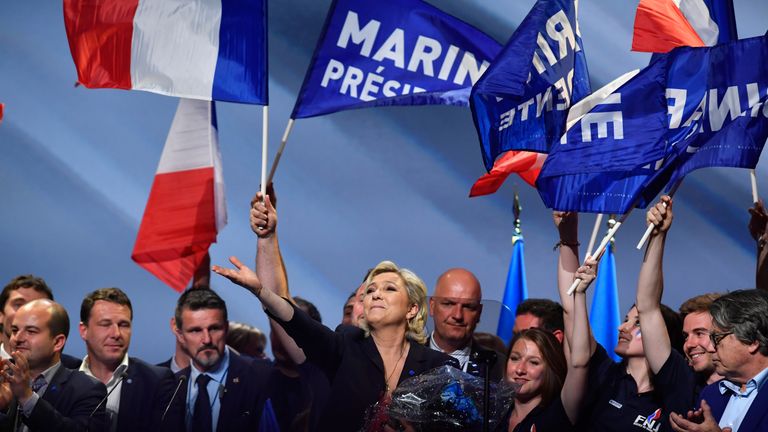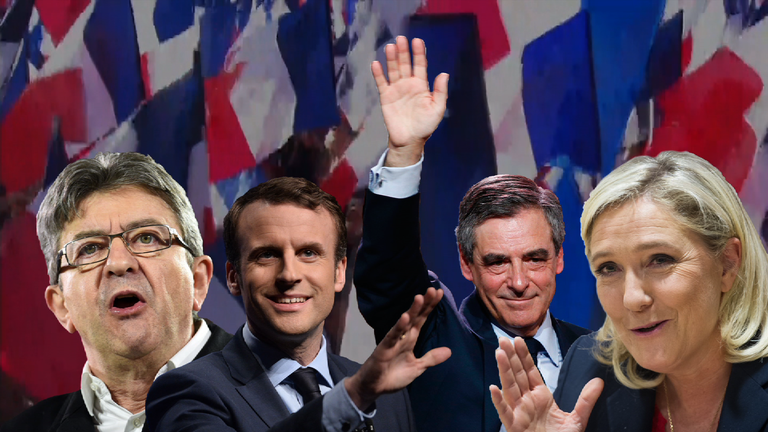Marine Le Pen's rise is about more than just race and immigration
Away from the rallies, Sky's Mark Stone finds the far right leader's appeal has broadened beyond her traditional policies.
Thursday 20 April 2017 02:10, UK
As the arena fills up, the chants of "On est chez nous" grow louder.
It's a familiar phrase from traditional National Front supporters. "We are at home."
Their intended inference is: This is our land.
For critics, it points to the xenophobic core of Marine Le Pen's far-right party.
For the faithful, it's a statement of the obvious: "France is our country, foreigners are not welcome."
"I am here to defend your intangible heritage... language, culture, flag, social tradition, customs, rules, values... it is all yours," the presidential candidate has said, in various forms, repeatedly.
In Marseille, at her last scheduled appearance before the first round of the election on Sunday, the Dome Arena - capacity 8,000 - is nearly full.
"On est chez nous!"
In one sense, their chant is indisputable. This part of southern France is a stronghold of the far-right party.
The traditional anti-immigration policies have combined well down here with the more moderate veneer Ms Le Pen has put on the party.
She walked on stage to a spontaneous rendition of the Marseillaise. She's preaching to the converted here.
Unlike the rallies of her rivals, where the inquisitive undecided voters (and there are many) turn up, here most are evidently convinced she's the one.
The focus was on immigration. She pledged a 10% tax on companies hiring foreigners; she said benefits would only be given to French people.
France's frontiers would become hard borders - a President Le Pen would remove the country from the Schengen open border zone.
"All we have done is watch as people flocked in and ruined what we had. Immigrants have turned the country into a giant squat." she told the crowd.
"Prayers in the street; women banned from cafes. That's not French. And it will never become French.
"I will be the president who will protect you and guarantee our national identity."
Watching is Stephane Guelpa. The 43-year-old web designer, who was born and bred in Marseille, said: "I have lived here for 43 years and seen nothing but change. It's not the place it once was.
"I am not a racist. I have travelled the world: Africa, Asia.
"When I go to those countries I want to see foreigners. But not in my country. I am fed up of walking down my street and not even being able to buy a slice of ham.
"Things are going to change. That is why I will support her."
But it's away from the hardcore support at the rallies that you sense how the lure of Ms Le Pen has broadened beyond race and immigration.
Marseille is the Mediterranean gateway to Europe. France's second largest city is a playground for the rich - its marina is jammed with yachts - but it was built on immigration.
It's where identity, politics, race, religion all collide; in its markets and narrow streets, the election campaign feels raw.
At the port, I meet brothers David and Joe Jurgens. They've been fishermen all their adult lives. Their politics is driven not by race. For them it simple maths: fishing quotas.
"Being in the EU, it's killing us. When we switched from the franc to the euro, everything changed. I mean, look at you in the UK - didn't you vote to leave?!" David tells me.
It's people like this for whom Ms Le Pen offers hope.
They're not traditionally far right but drawn by her pledge to ditch the euro and quit the EU.
They're voting on what matters to them, never mind her wider policies.
But in the market where their fish ends up is the other side to the story of the Le Pen rise: fear.
We stop for a coffee and get chatting to Adjel Meddah. He manages the Apple Store in Marseille. He is French-born, a French citizen of Algerian heritage, and he's worried.
"For my community it's really hard because her programme is completely crazy," he says.
"I don't feel included at all because all the time when the politicians speak about my people, people from the same background I have, they say 'Arab' before saying they are French people."
He won't vote, he says. His friend, also of Algerian descent, agrees about the identity issue but will vote for far left candidate Jean-Luc Melenchon.
The irony is that if Mr Meddah's apathy is widespread, and the polls suggest that it could be, it will help Ms Le Pen to victory.
Standing nearby is Mohammed Sahadi, born under the French flag in Algeria in 1945. He's a French citizen and has 20 grandchildren brought up here, and yet he too doesn't feel accepted as French.
"If she wins, a catastrophe," he says. "We'll be up to our necks in blood."
Criss-crossing the country, you can really feel the political pull in different directions; the undecided, the unconvinced, the confused.
Marine has managed to alter and soften the Le Pen brand. Her party is at its most popular in its history.
Back at the port, I ask the fishermen siblings: What if she does actually win?
David Jurgens pauses.
"If she wins, France will be turned inside out, and this country will self-destruct, with people fighting among themselves. But yeah, it's true she has defended the fishing industry."
My sense is the Jurgen brothers will vote Le Pen.








